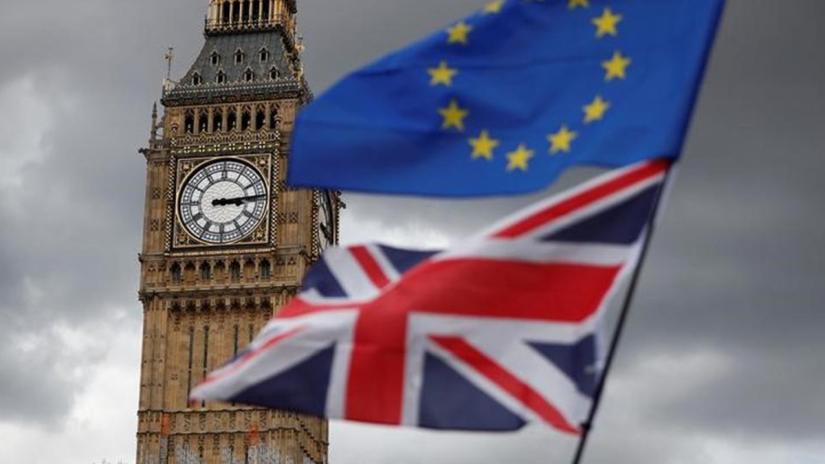 The black hole that is Brexit is now exerting its gravitational pull on the UK budget. Beset by uncertainties about reaching a deal with the EU, Chancellor of the Exchequer Philip Hammond is expected to stall when he presents his plans to the House of Commons on Oct. 29 – doing as little as possible. But that will only postpone a looming confrontation with fiscal reality, which will dash Brexiter hopes and confound European fears of Britain turning into a low-tax competitor outside the EU. Instead, the British state will turn more European with higher levels of tax and spending.
The black hole that is Brexit is now exerting its gravitational pull on the UK budget. Beset by uncertainties about reaching a deal with the EU, Chancellor of the Exchequer Philip Hammond is expected to stall when he presents his plans to the House of Commons on Oct. 29 – doing as little as possible. But that will only postpone a looming confrontation with fiscal reality, which will dash Brexiter hopes and confound European fears of Britain turning into a low-tax competitor outside the EU. Instead, the British state will turn more European with higher levels of tax and spending.
Hammond will be able to present a holding operation on Monday thanks to continuing progress in bringing down borrowing. The budget deficit in the financial year that ended in March was less than 2 percent of GDP, far below the 10 percent peak reached in 2009-10 and the lowest since the early 2000s. Borrowing also looks set to come in lower than expected in the current financial year.
However, the achievement is overstated because the deficit excludes public borrowing to finance student loans, much of which will not be repaid. It is also partial because net public debt has soared since the financial crisis, from 35 percent of GDP in 2007-08 to 85 percent in the last financial year. Even though low interest rates make this bearable, the high debt burden weighs on the chancellor, limiting his capacity to borrow more.
But the real problem for Hammond is that his success in lowering the deficit is a victory in a forgotten war. The new political and budgetary battleground is the increasingly critical condition of Britain’s public services following an almost decade-long funding squeeze. Staff reductions following cuts in the prison budget have, for example, taken their toll. Assaults within jails, both on fellow prisoners and on officers, have soared. A further casualty of the cuts has been funding for adult social care. The NHS itself is chronically overstretched.
The lower budget deficit flatters to deceive because it takes no account of pent-up pressures for higher spending to meet demand for better public services, above all in the NHS. Britain has been here before. The Treasury has a bad habit of overdoing spending squeezes to the point where they work only in spreadsheets rather than the experience of the public. The last crackdown on expenditure after a surge in borrowing in the early 1990s went too far, eventually prompting a prolonged rebound in spending under Labour after it won power in 1997. When governments change tack it is the prime minister rather than the chancellor who leads the way. Tony Blair lit the touch paper for Labour’s public spending boom at the start of 2000 when he responded to anxiety about the NHS by pledging to bring health spending up to the EU average. Tellingly, Theresa May ripped up the government’s spending plans this summer to announce a big birthday present for the health service – a five-year funding boost – on its seventieth anniversary. She was at it again at the Conservative Party conference in early October, claiming that austerity was over.
When governments change tack it is the prime minister rather than the chancellor who leads the way. Tony Blair lit the touch paper for Labour’s public spending boom at the start of 2000 when he responded to anxiety about the NHS by pledging to bring health spending up to the EU average. Tellingly, Theresa May ripped up the government’s spending plans this summer to announce a big birthday present for the health service – a five-year funding boost – on its seventieth anniversary. She was at it again at the Conservative Party conference in early October, claiming that austerity was over.
But May and Hammond cannot simply follow where Blair and his chancellor Gordon Brown led two decades ago, because the auspices for the public finances are so much less favorable now. Labour could preside over a sustained expansion in public spending because the economy flourished in the decade leading up to the financial crisis, buoyed by high productivity growth and an expanding workforce swelled by migration. Hammond cannot bank on a similar benign outturn. Even if productivity growth recovers after grinding to a virtual standstill in the past decade, population ageing will curb any contribution to GDP growth from higher employment.
Brexit rubs salt in the wound. By stopping the free movement of people from the EU it limits the scope for migration to offset the demographic brake. And by harming Britain’s main trading relationship it inflicts further economic costs. Already GDP is 2.5 percent smaller than if Britain had voted to remain in the 2016 referendum, according to the Centre for European Reform.
Since GDP is the tax base, Britain’s mediocre growth prospects spell trouble for the Treasury. Turning a headache into a migraine, population ageing will necessitate much higher public spending. As the big baby-boom cohort born after World War Two retires, taxpayers must pay for the swelling number of old people receiving state pension benefits (the equivalent of America’s Social Security) and needing extra health care. The Office for Budget Responsibility, a fiscal watchdog, anticipates an increase in age-related spending of almost 4 percent of GDP over the next two decades.
Britain will have to confront a hard choice it has been able to duck in the past. It will no longer be possible to combine European public services and welfare with American taxes. The perennially exigent NHS will undoubtedly need more birthday presents while other public services desperately require extra funding. Given the underlying demand for higher spending and the limit on more borrowing, taxes will have to rise substantially. That is what the public wants, with a long-running opinion survey showing that 60 percent back the government spending and taxing more, double the share in 2010 and the highest for fifteen years.
On IMF figures, Britain currently raises 36.1 percent of GDP in revenues, higher than America’s 31.7 percent but lower than Germany’s 44.5 percent. An increase in taxation of at least 1 percent of GDP over the next few years is a bare minimum and one of 2 percent is more likely. Whatever the scale of the increase it would move Britain closer towards the European model.
Hammond will postpone making that historic choice in his budget, but arguably May has already made it through her pledge to the NHS. The fiscal reckoning will be unpalatable for Brexiters yearning to resurrect the Thatcherite dream of a smaller state. Instead, Brexit will intensify already powerful pressures in the opposite direction. The inconvenient truth is that as Britain leaves the EU, taxation will have to rise, shifting the British state closer towards the high-tax European model.
London-based writer, Paul Wallace is a former European economics editor of The Economist. He is the author of “The Euro Experiment,” published by Cambridge University Press
 Opinion
Opinion
30897 hour(s) 59 minute(s) ago ;
Morning 04:54 ; Friday ; Apr 26, 2024
Why Britain’s economy will be more European after Brexit
Send
Paul Wallace
Published : 16:56, Oct 27, 2018 | Updated : 19:10, Feb 06, 2019
Published : 16:56, Oct 27, 2018 | Updated : 19:10, Feb 06, 2019
0 ...0 ...
/zmi/
Topics: Paul Wallace
***The opinions, beliefs and viewpoints expressed in this article are those of the author and do not reflect the opinions and views of Bangla Tribune.
- KOICA donates medical supplies to BSMMU
- 5 more flights to take back British nationals to London
- Covid19: Rajarbagh, Mohammadpur worst affected
- Momen joins UN solidarity song over COVID-19 combat
- Covid-19: OIC to hold special meeting
- WFP begins food distribution in Cox’s Bazar
- WFP begins food distribution in Cox’s Bazar
- 290 return home to Australia
- Third charter flight for US citizens to return home
- Dhaka proposes to postpone D8 Summit
Unauthorized use of news, image, information, etc published by Bangla Tribune is punishable by copyright law. Appropriate legal steps will be taken by the management against any person or body that infringes those laws.
Bangla Tribune is one of the most revered online newspapers in Bangladesh, due to its reputation of neutral coverage and incisive analysis.
F R Tower, 8/C Panthapath, Shukrabad, Dhaka-1207 | Phone: 58151324; 58151326, Fax: 58151329 | Mob: 01730794527, 01730794528


